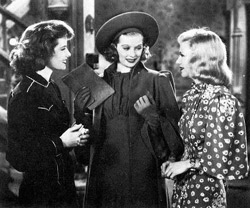 Idea: A quiet young man (Ryan Gosling) shocks his brother (Paul Schneider) and sister-in-law (Emily Mortimer) by ordering a Real Doll and introducing her as his girlfriend Bianca. When their psychologist (Patricia Clarkson) advises them to act as though Bianca is a real person, the community embraces Bianca and helps her integrate into daily life.
Idea: A quiet young man (Ryan Gosling) shocks his brother (Paul Schneider) and sister-in-law (Emily Mortimer) by ordering a Real Doll and introducing her as his girlfriend Bianca. When their psychologist (Patricia Clarkson) advises them to act as though Bianca is a real person, the community embraces Bianca and helps her integrate into daily life. Listen, I would probably follow Ryan Gosling anywhere, cinematically speaking. When I saw a link for this list, I knew he would be taking home number one. That said, I've got to agree with David Edelstein on this one: he plays it asexually, and I have no idea why. It's not that Gosling isn't, as per usual, perfectly timed and adorable and believable. It's that a man who has no sex life and apparently no desire for one would order a life-sized sex toy, continue to have no sexual relationship with it, and, eventually . . . Well, we won't talk about eventually.
It's not so much a problem with Gosling's performance, per se, as it is with Nancy Oliver's script in general. The idea that a young man would have such a delusion and what real problem he would use it to help him deal with (the problem is obvious to the point of being annoying when it is finally identified out loud within the movie, but fortunately it's only a minor annoyance) are both excellent cinematic ideas. Oliver's script is deadpan and darkly funny and occasionally very sweet. But it also refuses to deal with any adjacent issues to the one that Lars is working out via Bianca, and it ends before it should. We get about nine-tenths of the way through his problem, but the audience needs the home stretch. I know I am being very vague (well, more so than usual), but I don't want to give too much away. Or maybe I am wrong. Maybe I am supposed to tell you what exactly Lars is working through because it isn't supposed to be that much of a reveal. But I think it is. Why else wait to get specific until so close until the end of the movie if you want people to know up front?
First time-ish director Craig Gillespie (he also directed last year's Mr. Woodcock, which makes me very sad for him, but the point is that I don't know which one he directed first) proves himself more than capable with bringing out the dark humour in the process Lars goes through, particularly with his cuts and the way he holds his camera. He's got a good eye for being sensitive and respectful and still hilarious. I hope his next picture is more like this one.
The rest of the cast give uniformly wonderful performances: Mortimer is a fluid actress; Clarkson rarely raises her voice above a whisper and breaks our hearts without trying; Schneider is enraged and mortified. Kelli Garner is a treat as Lars's co-worker with a crush (three guesses on who!), but she plays another character that Oliver's script has no interest in looking at too deeply. It's a shame, really. I think there might have been something there.
If you can see yourself past premise, there is plenty to enjoy. If you can't, there's still some fun in there for you. B












